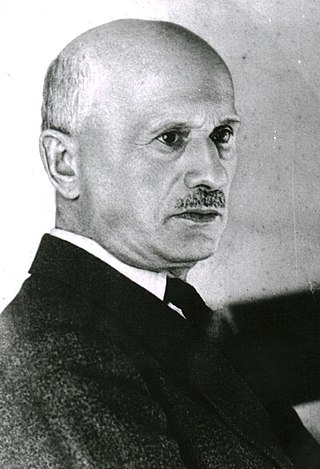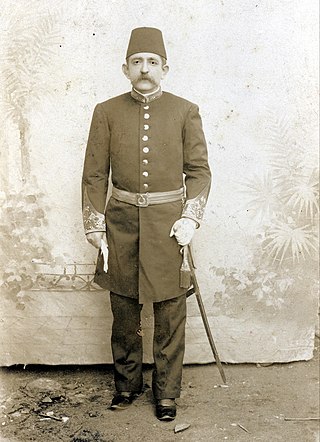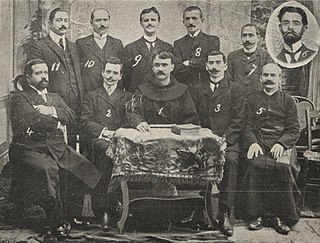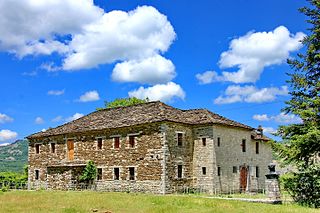
Greater Albania is an irredentist and nationalist concept that seeks to unify the lands that many Albanians consider to form their national homeland. It is based on claims on the present-day or historical presence of Albanian populations in those areas. In addition to the existing Albania, the term incorporates claims to regions in the neighbouring states, the areas include Kosovo, the Preševo Valley of Serbia, territories in southern Montenegro, northwestern Greece, and a western part of North Macedonia.
The Albanian National Front Party is a nationalist political party in Albania, Kosovo, and North Macedonia.

Tetovo is a city in the northwestern part of North Macedonia, built on the foothills of Šar Mountain and divided by the Pena River. The municipality of Tetovo covers an area of 1,080 km2 (417 sq mi) at 468 meters (1,535 ft) above sea level, with a population of 63,176. The city of Tetovo is the seat of Tetovo Municipality.

Mid'hat Bey Frashëri was an Albanian diplomat, writer and politician. The son of Abdyl Frashëri, one of the most important activists of the Albanian National Awakening in 1908 he participated in the Congress of Monastir. In 1942 he became the president of Balli Kombëtar, an Albanian fascist collaborationist and anti-communist movement during the Second World War. Frashëri is referred to as one of the fathers of modern Albanian nationalism.
Albanian nationalism is a general grouping of nationalist ideas and concepts generated by ethnic Albanians that were first formed in the 19th century during the Albanian National Awakening. Albanian nationalism is also associated with similar concepts, such as Albanianism and Pan-Albanianism, that includes ideas on the creation of a geographically expanded Albanian state or a Greater Albania encompassing adjacent Balkan lands with substantial Albanian populations.

Skopska Crna Gora or Karadak Mountains, often called simply Crna Gora, is a mountain range and ethnographic region in North Macedonia, Kosovo and Serbia. The highest peak is Ramno 1,651 m (5,417 ft) in Macedonia. The largest town on the mountain is Kučevište in North Macedonia.

Lef Nosi was an Albanian publisher, archivist, philologist, folklorist, ethnographer, numismatist, archaeologist and politician. On 28 November 1912, he was as one of the signatories of the Declaration of Independence, representing Elbasan. During the Second World War, Nosi was a leading member of Balli Kombëtar and was chosen as a member of the Albanian High Council.

Zihni Abas Kanina Hamzaraj was a prominent Albanian diplomat and politician. He was one of the signatories of Albanian Declaration of Independence. He was born in a notable Albanian family in Kanina, near Vlora, and was active during the National Renaissance of Albania. After the declaration of independence, he was Director General in the Ministry of Foreign Affairs in the Provisional Government of Albania, a post he would regain during the Kingdom of Ahmet Zogu. During the Second World War he worked as a teacher of the Albanian language in his hometown, becoming a prominent activist of Balli Kombetar against occupants and communist forces. After the war, the established communist regime jailed him in 1951 on political motives and he died in 1959 in the jail of Tirana.

The Congress of Manastir was an academic conference held in the city of Manastir from November 14 to 22, 1908, with the goal of standardizing the Albanian alphabet. November 22 is now a commemorative day in Albania, Kosovo and North Macedonia, as well as among the Albanian diaspora, known as Alphabet Day. Prior to the Congress, the Albanian language was represented by a combination of six or more distinct alphabets, plus a number of sub-variants.

Aqif Pasha Biçaku mostly known as Aqif Pashë Elbasani was an Ottoman Albanian political figure in the Sanjak of Elbasan and after the Young Turk Revolution became an activist for the Albanian national cause.
Albanian nationalism in North Macedonia traces its roots in the wider Albanian nationalist movement which emerged as a response to the Eastern Crisis (1878) and proposed partitioning of Ottoman Albanian inhabited lands in the Balkans among neighbouring countries. During the remainder of the late Ottoman period various disagreements culminated between Albanian nationalists and the Ottoman Empire over socio-cultural rights. The Balkan Wars (1912–13) ending with Ottoman defeat, Serbian and later Yugoslav sovereignty over the area generated an Albanian nationalism that has become distinct to North Macedonia stressing Albanian language, culture and identity within the context of state and sociopolitical rights. Pan-Albanian sentiments are also present and historically have been achieved only once when western Macedonia was united by Italian Axis forces to their protectorate of Albania during the Second World War.
Kosovo is the birthplace of the Albanian nationalist movement which emerged as a response to the Eastern Crisis of 1878. In the immediate aftermath of the Russo-Ottoman war, the Congress of Berlin proposed partitioning Ottoman Albanian inhabited lands in the Balkans among neighbouring countries. The League of Prizren was formed by Albanians to resist those impositions. For Albanians those events have made Kosovo an important place regarding the emergence of Albanian nationalism. During the remainder of the late Ottoman period various disagreements between Albanian nationalists and the Ottoman Empire over socio-cultural rights culminated in two revolts within Kosovo and adjacent areas. The Balkan Wars (1912–13) ending with Ottoman defeat, Serbian and later Yugoslav sovereignty over the area generated an Albanian nationalism that has become distinct to Kosovo stressing Albanian language, culture, and identity within the context of secession from Serbia. Pan-Albanian sentiments are also present and historically have been achieved only once when part of Kosovo was united by Italian Axis forces to their protectorate of Albania during the Second World War.

The village of Frashër in southern Albania saw the emergence of several notable families in the history of Albania. They contributed to the independence of Albania throughout military actions but also in literature and politics. The most notable of these families are the family to which belonged Naim Frashëri, national poet of Albania.
Ballistet are ultra supporters of the KF Shkëndija football club in Tetovo, North Macedonia. They were officially established as the main ultras group for Shkëndija in 1992.








